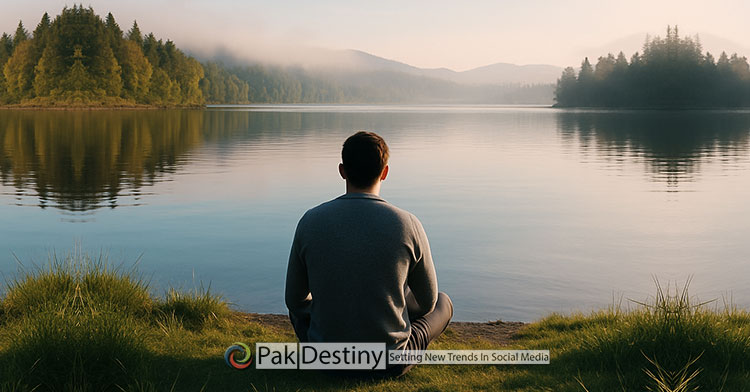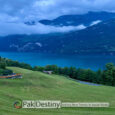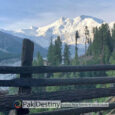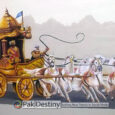
“What is the purpose of your visit to Oresjö Lake?” an old man gently asked me.
Oresjö Lake is located about a twenty-minute drive from the city of Borås in Sweden. The area is a beautiful blend of lakes and forests, showcasing nature at its most inventive and aesthetically pleasing. My colleague Mikael and I had a day off from work, so we decided to explore the surroundings of Borås, with Oresjö being our first spontaneous stop after a twenty- minute bus ride. We wandered through the small town and discovered the expansive, beautiful lake. I was spellbound by the natural beauty—the blue waters stretching to the horizon, the large green forest behind us, and the lush grass providing an astounding view. As Mikael and I began walking along the lake, we were amazed to find ourselves alone in such a vast space. In the distance, we spotted a figure sitting by the water’s edge. Approaching him, we discovered it was an old man engaged in fishing. We asked for permission to sit nearby and struck up a conversation. His name was Alfred, a 95-year-old entrepreneur who had founded and chaired four tech companies in Sweden. Even in his advanced age, he remained actively involved on the boards of all four companies. On weekends, he enjoyed cycling and fishing.
“We are here just for sightseeing,” I replied to Alfred. “I had a day off from work, so I decided to explore the nature around Borås. I asked my colleague Mikael to join, we decided to travel randomly and stopped at this lake. We liked the view, and we kept walking, which is how we ended up here with you.”
“Great! You both look like real travellers. But what is the purpose of your sightseeing?” he asked again.
I was taken aback by his probing question and decided to respond with a question of my own. “What is the purpose of your visit to this lake?”
He smiled. “I am here for fishing, which will provide me with a tasty and healthy lunch to satisfy my taste buds. More importantly, I am here to spend quality time alone, to explore my inner self and engage in conversation with myself.”
He continued speaking. “Every action, every task, everything has a purpose, so your sightseeing visit to this lake must have a purpose too—even if you haven’t thought about it clearly.”
“Never mind. How about playing a game called the ‘Purpose Game’? Are you interested?” he asked, his compassionate smile brightening his face.
“What is the purpose of the existence of cows?” he inquired.
“Cows provide milk and meat to humans. However, cows were not originally meant to serve this purpose; humans domesticated them for their own benefit,” Mikael replied.
“Yes, you are absolutely right. In any case, a cow’s life has a purpose: to serve human beings,” Alfred chuckled.
“You may know that during the Chinese Civil War from 1945 to 1954, a large number of farmers were killed, leading to widespread famine in China.” He continued, “Chairman Mao launched ‘The Four Pests Campaign,’ one of the first initiatives of the Great Leap Forward in Maoist China from 1958 to 1962. Authorities targeted four ‘pests’ for elimination: rats, flies, mosquitoes, and sparrows. The idea was to eradicate every sparrow that was supposedly destroying crops that could feed the Chinese nation. The Chinese obeyed the order and killed every sparrow and insect that appeared to be eating their food.
The result was astonishing; the following year, the crops were even less than they had been before. Locusts heavily attacked their crops that year, worsening the famine. The purpose of sparrows and insects was revealed: although they eat some grains, they actually protect the crops from locusts and other pests, ultimately saving more in the end.”
“So, every creature has a purpose. Every animal and plant lives a purposeful life. Some provide direct support to nature in the form of products, while others play a crucial role in the ecosystem. I once saw the winning speech of an Ethiopian marathon athlete after he won a gold medal at the Olympics. He said that now he could die peacefully, satisfied that he had done something meaningful for his countrymen and that his life had served a purpose.”
Alfred continued, “I have a cat at home, our pet, who is the sweetheart of my wife and kids. I often ponder the purpose of the cat’s existence. Our house is protected from rats, bats, and many other creatures my wife dislikes. Yet, I still wonder about the true purpose of the cat’s life. Perhaps one day it will be revealed. I also observe that many of us, as human beings, lead lives similar to that of a cat—doing little work that doesn’t leave a meaningful mark for anyone, eating, sleeping, wandering around, exploring, having kids, feeding them, and then eventually dying. I don’t want to live a life like that. For the last 60 years, I have come to this lake to enjoy my solitude, and it was here that I discovered my purpose in life.”
Mikael interjected, “Sir, if you don’t mind, may I offer a different perspective?” Alfred smiled and nodded encouragingly.
“Sir, life is random and evolutionary. Based on scientific evidence such as the Big Bang theory, human evolution theory, DNA research, and the discovery of organic fossils, we are nearly certain that life is simply a random occurrence. The
purpose of life is just a story created by our ancestors for their own agendas and benefits.”
Alfred smiled, unfazed by Mikael’s opposing view. “Homo sapiens have many stories, and our supremacy over other creatures is based on these narratives. If we were to eliminate all these stories from our lives, it would be difficult to survive in this competitive world, to create good societies and nations, to establish families, and to uphold humanity. All of these institutions are built on stories we call values, systems, and laws.”
“I am a storyteller. Let me share another story,” Alfred leaned closer to us.
“Last year, I went on a camping trip to Örebro, a small town near Stockholm. A local shared stories about a beautiful thousand-year-old castle near a river, about five kilometers from our campsite. I woke up early before sunrise, packed my trekking gear, and set off in the direction he had indicated. However, I missed the right turn and continued walking along the river. After hours of trekking, I still hadn’t reached the castle, but I kept going. When the sun began to rise, I found myself on a small hill with a stunning view of the green valley, the blue river, and the rising sun. I sat there for hours, appreciating the beauty of nature, and in that moment, I felt fulfilled. I talked to myself, exploring my inner self. That day turned out to be one of the best of my life.
“Now, consider this: my original purpose for rising early and trekking was to reach the castle. I didn’t make it, whether because I missed a turn or because the castle was merely a story that never existed. But in the end, my journey gave me a reason to wake up early, to trek, and to appreciate everything I
experienced along the way. The destination of the castle was not my true purpose; instead, it was about appreciating and exploring the beauty of the land around me. The purpose was to keep traveling and to enjoy the journey itself.”
Alfred began packing his belongings, preparing to leave.
“One day, I contemplated the purpose of mosquitoes, which are among the biggest killers of mankind, second only to humans themselves, through diseases like malaria and dengue,” he remarked thoughtfully.
“Were you able to find the answer?” I asked anxiously.
“Not entirely, but according to recent scientific research, they are part of our ecosystem as they serve as food for frogs and fish. In my view, mosquitoes demonstrate the vulnerability of mankind against even the smallest creatures in this world.”
“Alright, young men, I’m glad you came here. I must leave now. This is a great opportunity for you to explore yourselves. Natural places like this lake serve as catalysts, enhancing your communication with your inner self, your soul, and your essence.”
With that, he departed. We sat quietly by the stupendous lake, with the blue water before us, the green grass around us, and a sense of calm in the atmosphere. In that moment, I felt that nature was beginning to speak to my inner self, prompting me to reflect on the purpose of my own existence in this world.

The author — Rana Sohail Ahmad — a multifaceted author, entrepreneur, and philanthropist. With a background in Engineering and Business Administration, he’s the founder and CEO of Four thriving Global companies. Beyond his professional success, Rana is deeply interested in psychology, history, Technology and social sciences. He’s also an avid cyclist, yoga instructor, and health trainer. However, his most significant endeavor is the Quest of Happiness Foundation (QHF), which he founded to spread happiness and well-being. QHF conducts workshops on happiness, physical health, and career planning, especially for teenagers and university graduates, while also taking part in social initiatives like cleaning and plantation campaigns. Rana Sohail Ahmad’s upcoming book offers a unique blend of personal growth, and social responsibility, all centered around the theme of happiness with scientific and management practices.





Very interesting and thought provoking 👍